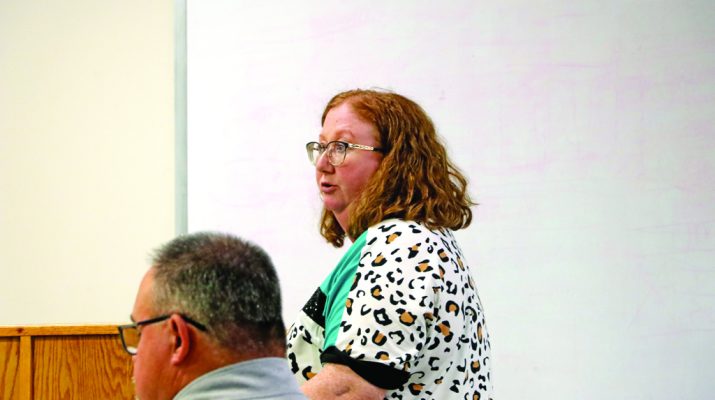Before members of the Alliance Public Schools Board of Education were asked to take a vote on the mandatory drug testing policy for students involved in extracurricular activities, they heard from a host of concerned parents and citizens who were present at the meeting to share their insights on the policy.

Lynette Richards, Executive Director of Monument Prevention in Scottsbluff, who has worked with other schools in the Panhandle to implement drug testing programs, spoke to the board members, urging them to implement the policy to curb drug use among students. Richards emphasized that participating in extracurricular activities is a privilege, not a right. She explained that a policy like this could serve as a deterrent for students who are considering using drugs.
Colleen Hood, an AHS Alum and Executive Director of Human Services Inc., explained that many of the clients she works with began using drugs and alcohol between 13 and 15 years old.
“It doesn’t matter what demographic they come from,” said Hood. “In thinking about my own children, when they were in activities, and also my experience with talking to my clients about what maybe would have helped, and sometimes kids need a reason not to use. Sometimes they don’t have support at home. They don’t have anybody to help out with that. If something is a passion for them, then that may be an excuse. Both my kids wanted to be college athletes, and they were, and are. That was a big piece of that. That’s something we preached from home, but not everybody has that from home.”
Hood explained that when intervention takes place, it lets people know that there are options for them, especially when they are young. She said that people need to look at the attitude found within the schools and the community toward drugs and alcohol. She explained that it is important to not turn a blind eye toward the issue.
“I just had someone in my family die from a drunk driver,” said Hood. “I wish he wasn’t drinking at 2 o’clock in the afternoon on a Sunday, but he did. My whole family has been impacted by that, and still has.”
Hood spoke about gateway drugs, alcohol, tobacco and marijuana, being a starting point for people who go on to use drugs such as Fentanyl, meth and cocaine. She emphasized that the problem needs to be addressed.
“I think we’ve got a huge problem going on, and we’ve got a lot of people dying,” Hood said. “I think that anything we can do to help is beneficial for not only our students, but our community.”
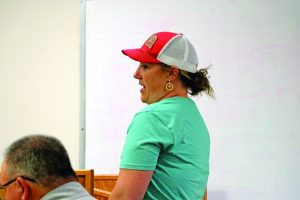
Chelsie Herian spoke in favor of the policy next, noting that she comes from a family that has battled addiction.
“I’m sorry if you disagree that the school shouldn’t intervene, but a lot of these kids, from what I understand, they look up to our school administrators, even you,” said Herian. “They look up to you. They might not have that guidance at home. So, I support the drug testing policy.”

Tearza Mashburn spoke to board members as a recovering addict and alcoholic, sharing how students would ask her for help with addiction and recovery after they would hear her story.
“We have drugs in our town, therefore we have drugs in our schools,” said Mashburn. “As children, we all make mistakes. As adults we make mistakes. We would like to think that our children are innocent, but because of these (cell phones) we can no longer believe that. It has a lot of good, but it also has a lot of bad that comes with them. I’d like for this policy to be seen as a positive aspect during our students’ high school careers.”
Mashburn said board members should send a message to students that they recognize their struggles and their need for help. She said the policy can save lives.
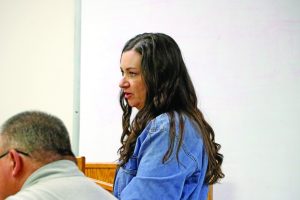
Lori Mazanec spoke next, sharing a story of how her daughter came home from school frightened after two of her classmates overdosed in class following lunch.
“She was devastated,” said Mazanec. “She was scared. She just did not know what to do, and they were active athletes. This policy was never intended to catch our students, rather to prevent and deter, and even to save.”
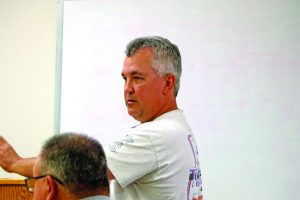
Mazanec said that the policy would contribute to the success of the students. Jeff Schneider spoke after Mazanec, offering a dissenting point of view regarding the policy. He explained that such a policy would be redundant because there are policies in place to address drug use. Schneider asked those in attendance how many of them actually drug test their children. Board Member Shana Brown stated that she drug tests her child.
Schneider said he believes drug testing initiates mistrust between parents and their children. He asked whether the district is using the tools they already have available to address drug usage. Superintendent Dr. Troy Unzicker explained that they regularly refer students for drug tests on site if there is suspected drug use. He said that if the test is positive, there is punitive action taken.
Schneider asked why his kids should be tested after the softball season is over if they do not participate in other activities. He said the policy provides the option of removing a child from the testing pool, noting that to re-enter the pool to be eligible to participate in an activity would result in an out-of-pocket cost. He noted that the policy is an overreach by the school district.
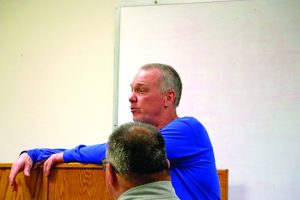
Tracy Stark, spoke after Schneider, offering insight as a jailer at the Box Butte County Jail. He explained that there is a drug problem in the community that needs to be addressed, and he believes this policy could be a tool to address it.
“I know we’re not all blind,” said Stark. “We know what’s going on. I think this is a good thing.”
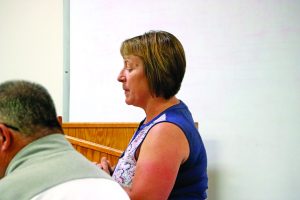
Tera Minnick shared the story of her child’s experience with drugs, noting that he was prevented from playing in sports as a result of using those drugs.
“The drugs that he got, he got at school, in the PAC,” said Minnick. “They’re there, and this was several years ago.”
Minnick explained that when she asked her child if this policy was in place when he was in school if he would have made different choices, he told her that he would have chosen sports over drugs.

Crystal Diddier, with WPCI, told board members that the program is beneficial and that they have options for how to implement the policy. She said this program is an opportunity for students to reduce peer pressure.
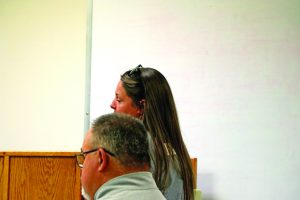
Jamie Fancher spoke to board members about her children, asking the board to drug test the students.
“We’re losing way too many kids, and it’s happening right here in our own community,” said Fancher.

Tim Flick, with the Nebraska State Patrol, explained that there are times when it is better to not involve law enforcement, noting that this policy would do more to help students address addiction than a punitive policy. He explained that there is a need for parents to be educated on the signs of drug use and that it all revolves around helping kids.
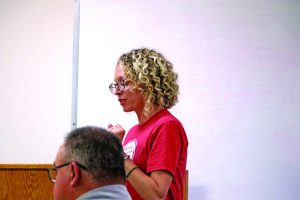
Jacque Bair spoke last at the meeting, noting that the administration is cracking down on drug usage. She explained through working at the office at the school, she feels helpless when she sees students who are under the influence of drugs. She explained that because she cares for the kids, she just wants to make sure they are okay.
Later in the meeting, the board voted 5-1 to implement the drug testing policy.
The following is a copy of the policy provided by Alliance Public Schools:

